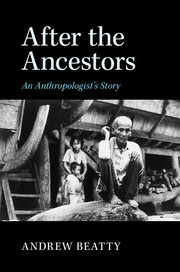Book contents
- Frontmatter
- Epigraph
- Contents
- List of illustrations
- Preface
- People
- Map
- Prologue
- 1 The statue
- 2 House key
- 3 Among women
- 4 Blood brothers
- 5 Daggers and debutants
- 6 Stormy Sunday
- 7 Three things that matter
- 8 The making of great men
- 9 A game of chess
- 10 Cholera song
- 11 Progress
- 12 Brothers and strangers
- 13 Exile and return
- 14 Field work
- 15 The chicken's neck
- 16 Good deaths and bad deaths
- 17 First family
- 18 Blessing
- 19 Half an egg
- 20 Waiting
- 21 Death of a chief
- 22 Ama Jonah at bay
- 23 Unravelling
- 24 The ethnographer and his double
- Epilogue
- Index
13 - Exile and return
Published online by Cambridge University Press: 05 March 2015
- Frontmatter
- Epigraph
- Contents
- List of illustrations
- Preface
- People
- Map
- Prologue
- 1 The statue
- 2 House key
- 3 Among women
- 4 Blood brothers
- 5 Daggers and debutants
- 6 Stormy Sunday
- 7 Three things that matter
- 8 The making of great men
- 9 A game of chess
- 10 Cholera song
- 11 Progress
- 12 Brothers and strangers
- 13 Exile and return
- 14 Field work
- 15 The chicken's neck
- 16 Good deaths and bad deaths
- 17 First family
- 18 Blessing
- 19 Half an egg
- 20 Waiting
- 21 Death of a chief
- 22 Ama Jonah at bay
- 23 Unravelling
- 24 The ethnographer and his double
- Epilogue
- Index
Summary
During the general election in April 1987, my research permit was suspended (the government did not want foreigners to observe its “festival of democracy”) and we had to leave Orahua. We spent three months “over the sea”, mainly in the capital, Jakarta. Following the trail of authority, we shuffled along corridors, haggled through nicotine-yellowed windows, fended off requests for bribes, offered them where necessary, and waited to be moved, cubicle by cubicle, towards some terminal sanctum, where a uniformed demigod wielding a gigantic pen (and who did nothing else) signed his approval with a six-inch signature. There is nothing very subtle about Indonesian power.
For those three months, we lost contact with the village. That there was no mail scarcely mattered. Had a reliable postal service existed, and had people known how to use it, we should have learned nothing, as villagers send messages only to request money or issue summons. (Come home. Father ill.) Nothing of significance can be communicated on paper. This rupture was a foreshadowing of our later exile from Nias, made absolute by return to England. In all the years since our fieldwork, we learned nothing of Orahua save what the Catholic missionaries occasionally passed on to us. (Orahua is outside their zone.) And so the people among whom we lived are forever as they were – not fixed in a dead past, like classmates in a school photo, but like family members cut off in their prime, never aging, never gone, still vividly present in the memory.
After our spell of exile, we returned to a village that had, in small but significant measure, changed. Susanna had died. The girl who had befriended us in the first days, briefly taken us over, then tormented us for all she was worth, was dead, aged seventeen. Ama Zinga's daughter, Elina, ran up to us with the news as we tramped into the house at dusk. Over the next few days, many people came up and told us, knowing we knew but wanting to convey their shock, or perhaps to register ours.
- Type
- Chapter
- Information
- After the AncestorsAn Anthropologist's Story, pp. 185 - 194Publisher: Cambridge University PressPrint publication year: 2015

